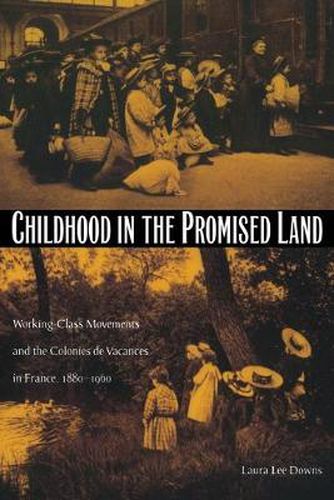Readings Newsletter
Become a Readings Member to make your shopping experience even easier.
Sign in or sign up for free!
You’re not far away from qualifying for FREE standard shipping within Australia
You’ve qualified for FREE standard shipping within Australia
The cart is loading…






This title is printed to order. This book may have been self-published. If so, we cannot guarantee the quality of the content. In the main most books will have gone through the editing process however some may not. We therefore suggest that you be aware of this before ordering this book. If in doubt check either the author or publisher’s details as we are unable to accept any returns unless they are faulty. Please contact us if you have any questions.
Childhood in the Promised Land is the first history of France’s colonies de vacances, a vast network of summer camps created for working-class children. The colonies originated as a late-nineteenth-century charitable institution, providing rural retreats intended to restore the fragile health of poor urban children. Participation grew steadily throughout the first half of the twentieth century, trickling up by the late 1940s to embrace middle-class youth as well. At the heart of the study lie the municipal colonies de vacances, organized by the working-class cities of the Paris red belt. Located in remote villages or along the more inexpensive stretches of the Atlantic coast, the municipal colonies gathered their young clientele into variously structures child villages within which they were to live out particular, ideal visions of the collective life of children throughout the long summer holiday. Focusing on the creation of and participation in these summer camps, Laura Lee Downs presents surprising insights into the location and significance of childhood in French working-class cities and, ultimately, within the development of modern France. Drawing on a rich array of historical sources, including dossiers and records of municipal colonies, discovered in remote town halls of the Paris suburbs, newspaper accounts and interviews with adults who participated in the colonies as children, Downs reveals how diverse groups-including local Socialist and Communist leaders and Catholic seminarians-seized the opportunity to shape the minds and bodies of working-class youth. Childhood in the Promised Land shows how in creating the summer camps, these various groups combined pedagogical theories, religious convictions, political ideologies, and theories about the relationship between the countryside and children’s physical and cognitive development. At the same time, the book sheds light on classic questions of social control, highlighting the active role of the children in shaping their experiences.
$9.00 standard shipping within Australia
FREE standard shipping within Australia for orders over $100.00
Express & International shipping calculated at checkout
This title is printed to order. This book may have been self-published. If so, we cannot guarantee the quality of the content. In the main most books will have gone through the editing process however some may not. We therefore suggest that you be aware of this before ordering this book. If in doubt check either the author or publisher’s details as we are unable to accept any returns unless they are faulty. Please contact us if you have any questions.
Childhood in the Promised Land is the first history of France’s colonies de vacances, a vast network of summer camps created for working-class children. The colonies originated as a late-nineteenth-century charitable institution, providing rural retreats intended to restore the fragile health of poor urban children. Participation grew steadily throughout the first half of the twentieth century, trickling up by the late 1940s to embrace middle-class youth as well. At the heart of the study lie the municipal colonies de vacances, organized by the working-class cities of the Paris red belt. Located in remote villages or along the more inexpensive stretches of the Atlantic coast, the municipal colonies gathered their young clientele into variously structures child villages within which they were to live out particular, ideal visions of the collective life of children throughout the long summer holiday. Focusing on the creation of and participation in these summer camps, Laura Lee Downs presents surprising insights into the location and significance of childhood in French working-class cities and, ultimately, within the development of modern France. Drawing on a rich array of historical sources, including dossiers and records of municipal colonies, discovered in remote town halls of the Paris suburbs, newspaper accounts and interviews with adults who participated in the colonies as children, Downs reveals how diverse groups-including local Socialist and Communist leaders and Catholic seminarians-seized the opportunity to shape the minds and bodies of working-class youth. Childhood in the Promised Land shows how in creating the summer camps, these various groups combined pedagogical theories, religious convictions, political ideologies, and theories about the relationship between the countryside and children’s physical and cognitive development. At the same time, the book sheds light on classic questions of social control, highlighting the active role of the children in shaping their experiences.